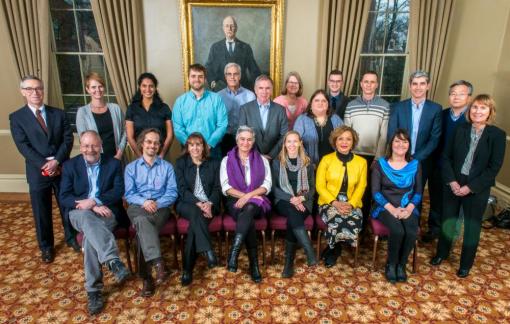 Twenty-five Brown researchers, including four from the School of Engineering, are receiving University research awards through 16 Research Seed grants, totaling almost $845,000. Research Seed Funding awards are competitively awarded and help faculty more successfully advance competitive research proposals by supporting the generation of preliminary data, pursuing new directions or collaborations in research, and other endeavors.
Twenty-five Brown researchers, including four from the School of Engineering, are receiving University research awards through 16 Research Seed grants, totaling almost $845,000. Research Seed Funding awards are competitively awarded and help faculty more successfully advance competitive research proposals by supporting the generation of preliminary data, pursuing new directions or collaborations in research, and other endeavors.
Since 2003, the Office of the Vice President for Research has been distributing these awards to faculty members with promising new ideas, according to Amy Carroll, director of research development.
"From 2006 to 2016, the OVPR awarded roughly $5.1 million through its internal research funding, enabling researchers to acquire $70 million worth of external grants," Carroll said. "This is a 13:1 return on investment for the University."
 Projects from the School of Engineering include: Dan Harris, who is investigating "Making an Impact: Dynamic Free-Surface Interactions", Pradeep Guduru and Haneesh Kesari, who are researching "Development of Materials with Designed Meso-scale Architectures for Dynamic Loading", and Shouheng Sun, Christopher Seto and Guduru, who are investigating "Green Chemistry Synthesis of PBO-Type Rigid Polymers."
Projects from the School of Engineering include: Dan Harris, who is investigating "Making an Impact: Dynamic Free-Surface Interactions", Pradeep Guduru and Haneesh Kesari, who are researching "Development of Materials with Designed Meso-scale Architectures for Dynamic Loading", and Shouheng Sun, Christopher Seto and Guduru, who are investigating "Green Chemistry Synthesis of PBO-Type Rigid Polymers."
Making an Impact: Dynamic Free-Surface Interactions
When small objects are gently deposited onto an air-water interface, their weight can be supported by the effects of surface tension. Bench-top demonstrations of this effect are simple to realize and are often one of the first experiments by which a student is introduced to the remarkable influence of surface tension at small scales. Recently, considerable work has been devoted to the statics of small particles supported at interfaces. However, less attention has been given to the dynamics of such particles at fluid interfaces, despite the broad relevance to numerous natural, scientific, and industrial systems. As an initial step towards advancing the current understanding of such dynamic interactions, we plan to conduct a detailed exploration of the impact of hydrophobic spheres onto an air-water interface. The proposed research direction includes both an experimental component conducted at Brown, and a complementary theoretical component developed with international collaborators at the University of Bath. This foundational work will facilitate future work in our lab aimed at gaining a more general understanding of the interactions of solid structures with liquid interfaces in scenarios where surface tension effects are dominant.
PI: Daniel Harris, Assistant Professor of Engineering
Funded: $50,000
Development of Materials with Designed Meso-scale Architectures for Dynamic Loading
We propose to develop a research program on developing new high-performance structural materials with designed meso-architectures that will have much higher resistance to the dynamic failure mode of adiabatic shear localization (ASL). Structures and materials subjected to dynamic loading often fail by ASL, which is a thermomechanical instability. Most of the existing work to-date on the dynamics of ASL treats the material as a homogeneous continuum with effective mechanical and thermal properties. However, it is known that alloys with nominally same composition but different microstructures can result in different resistance to failure by ASL; so, clearly and unsurprisingly, the material meso-architecture plays a crucial role in determining the resistance to ASL. However, there have been no studies on understanding the dynamics of the interaction between a propagating ASL and the material's meso-scale architecture; primarily because of experimental difficulties associated with measuring strain fields at high-spatial (~ microns) and high-temporal resolutions (micro-second) simultaneously. By using a new and unique experimental capability developed in the PI's lab that fills this gap in experimental diagnostics, we propose a systematic, combined experimental-theoretical study that aims to (i) understand the basic physics and mechanics of interaction between a propagating ASL and model meso-architectures; (ii) design, fabricate and demonstrate the superior performance "periodic layer" meso-architectures. The proposed research program, along with the newly developed experimental and computational capabilities place Brown researchers in a strong position among their peers to attract external grant support to grow the program.
PI: Pradeep Guduru, Professor of Engineering
Co-PI: Haneesh Kesari, Assistant Professor of Engineering
Funded: $41,595
Green Chemistry Synthesis of PBO-Type Rigid Polymers
Poly(p-phenylene-2,6-benzoxazole) (PBO) represents a class of well-known rigid polymers that have both excellent thermal stability and remarkable tensile strength and modulus (1.6 times that of Kelvar). These exceptional properties place PBOs among the strongest organic polymers for a wide number of applications such as ballistic fiber materials, smart electronic textiles, and flame resistance materials. However, the conventional approach to PBO synthesis via polymerization of diaminobenzenediol and terephthalic acid requires polyphosphoric acid (PPA) as the catalyst. As a result, the final PBO product inevitably contains traces of PPA that can also catalyze the hydrolysis of the benzoxazole ring in PBO in a humid environment. This, combined with the effect of UV-irradiation, is known to lead to rapid polymer degradation, causing the uncontrolled loss of mechanic strength and serious mechanical failures of the PBO materials. Combining three PI's expertise in nanoparticle catalysis, organic reactions, and mechanical property studies, this joint proposal intends to develop a green chemistry approach to PBOs with a controlled degree of polymerization, enhanced chemical stability against hydrolysis and/or UV-irradiation, and robust mechanical strength under various humidity conditions. With the OVPR seed support, the three PIs' efforts will evolve into a new multi-disciplinary research direction with chemistry, materials, mechanics and computations involved. The research will help to leverage both chemistry and mechanical engineering profiles in catalysis and materials research.
PI: Shouheng Sun, Vernon K. Krieble Professor of Chemistry, Professor of Engineering
Co-PI: Christopher Seto, Associate Professor of Chemistry
Co-PI: Pradeep Guduru, Professor of Engineering
Funded: $75,000